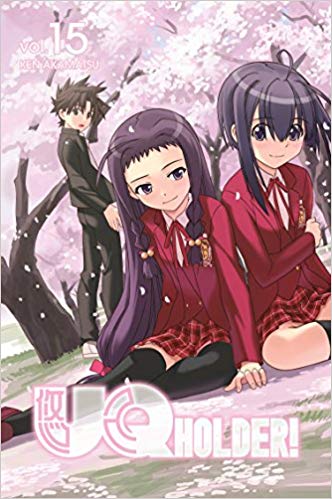By Ken Akamatsu. Released in Japan by Kodansha, serialization ongoing in the magazine Bessatsu Shonen Magazine. Released in North America by Kodansha Comics. Translated by Alethea and Athena Nibley.
There are spoilers in this review for the entire book, as well as the ending of Mahou Sensei Negima.
I’m actually tagging Negima in this review as well, because after a lot of faffing about, this is, finally, the Negima ending that actually resolves things. The entire volume reads as if Akamatsu is saying “Yeah, sorry about the end of Negima, I was fighting with Kodansha and threw a hissy fit, here’s a much better version of what happened.” The amusing thing, of course, is that UQ Holder doesn’t quite take place in the same universe as Negima – something explicitly spelled out by Tota here. The mysterious stranger from the cliffhanger of the last book (who turns out to be Chamo) is getting ready to show us a movie of what happened to Negi and company in Tota’s home world, through the dead eyes of Chachazero (which is really creepy when you think about it) when Dana bursts in, punches a middle school girl unconscious, and shows them an alternate universe “happy ending” – i.e. what happens in Negima’s home world.
That’s Nodoka and Yue on the cover, but sorry to break it to you, neither one of them wins the Negi sweepstakes. I had talked before about how the ending of Negima had him tell Asuna that he loved one of the girls, but didn’t say who, except Asuna’s surprise made it clear it wasn’t a) her, or b) one of the more obvious candidates. They do get to confess, and Negi turns them down, and it’s well-handled and very sweet. Then there’s Negi’s confession to the girl he actually does like. Given it wasn’t Asuna, the Naru-lookie likee, there’s only one other choice it could be given Akamatsu’s own preferences. It’s the OTHER Naru-lookie likee, Chisame. Again, you can see why Asuna was surprised but not THAT surprised. Chisame filled the role of Negi’s mentor and “common sense” throughout Negima, and he’s also commented on how pretty she is multiple times, much to her annoyance. The main issue is that Negi is far too young. Which is why, when he confesses, she shoots him down.
This leads to the funny parts of the book, as the ENTIRE CLASS was spying on them, and Ayaka in particular seems ready to burn Chisame to death with her mind for rejecting Negi. But Chisame’s right – despite all the many, many, MANY shotacon jokes in Negima, he really is too young to be dating. (She is also too young to be dealing with the fact that she really does like him too.) As such, we can swiftly move forward five years, to when Negi is sixteen, and show the final battle between him and the entity possessing his father. (Negi’s mother’s fate remains unknown – I assume she died at some point after he was born, but it’s never made clear.) The battle allows mostly everyone to take part (though the noncombatants are shown watching from the side in cat-eared spacesuits, and Eva and the three cheerleaders stay home) and lets Akamatsu do the only thing he loves more than nude harem chases – big fights with lots of punching.
After this epic battle, we move forward two more years and get the epilogue. Everyone lives happily ever after. Negi, now an adult, marries a grumpy, blushing Chisame (which makes Kyrie very happy – she’s likely noticed that she and Chisame are the same, and thus this increases her chances) and his recovered father marries Evangeline (I assume that he freed her from her curse at some point, though honestly she still looks about ten years old in the wedding photo.). I was amused at Tota pointing out the flaws inherent in Akamatsu’s own plotting – the entire happy ending depends on Asuna getting rescued via time travel, which many readers at the time called a giant cheat, and so does Tota, saying they have to get their own happy ending without cheating. (I didn’t have issues with the time travel in the original ending, as I felt it had been foreshadowed quite well.) Perhaps now Akamatsu can get on with moving forward with his new cast and dealing with the plot in their own universe… though given all the villains are essentially dark variations on the cast of Negima, this seems unlikely.
If you liked Negima but have not read UQ Holder, you should pick up this volume anyway – you really don’t need to know much about the latter to understand this, and it gives much better closure to the series. Just… five and a half years later.

